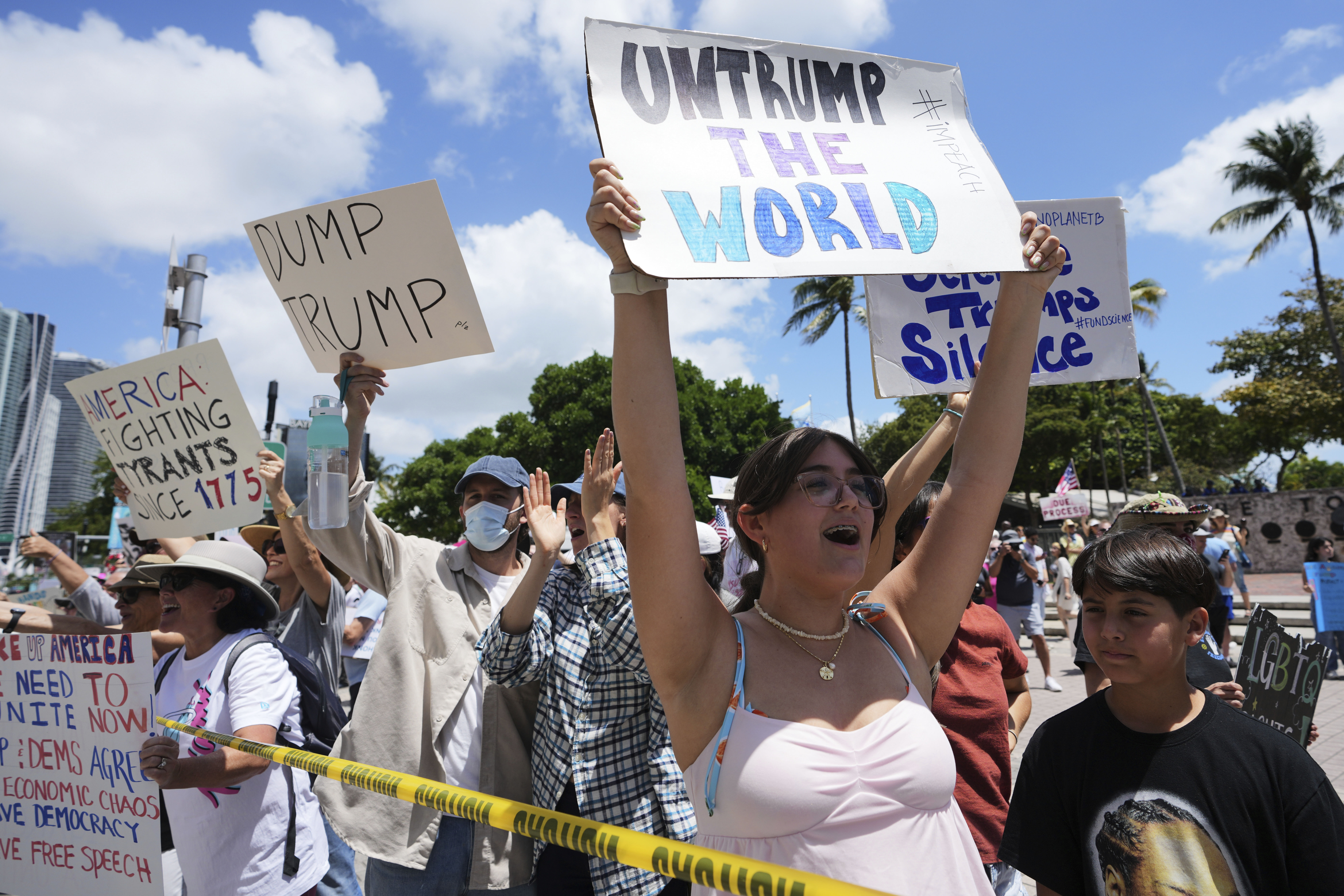For more than a year, students at US colleges and universities have participated in protests in support of Palestine, as Israel’s war has killed more than 50,000 Palestinians in Gaza since October 2023. Students have faced suspensions and expulsions over encampment demonstrations and other actions, as schools crack down on participation.
Now, at least five students and academics of color at US universities have been targeted by Immigration and Customs Enforcement (Ice), as a part of the Trump administration’s ongoing punishment on Palestinian support.
“What we’re seeing is the use of immigration law to go after visa holders, permanent lawful residents, [over] their speech,” said Samah Sisay, a staff attorney at the Center for Constitutional Rights (CCR). “He’s trying to suppress political speech that goes against what the administration wants.”
Despite white students, professors and academics also being heavily involved pro-Palestinian protests, people of color have disproportionately faced sudden arrests and threats of deportation or had their visas revoked.
“We’re just seeing the focus on very specific people,” said Sisay, referring to academics of color. “I think it really is to try to create a wedge in solidarity, the multiracial, multiethnic solidarity that’s been created in support of Palestinian human rights.” Ice’s actions, she said, have “set a warning for students of color at these universities who rely on scholarships and educational support to improve their lives or better the situations for their family”.
Yunseo Chung, a 21-year old Columbia student and legal permanent resident who moved to the US from South Korea at age 7, is currently in hiding after Ice officials attempted to detain her. Chung attended a few pro-Palestinian demonstrations over the past months, and was arrested on 5 March at a protest at Barnard College. On Tuesday, a federal judge granted Chung a temporary restraining order to prevent Ice from detaining her, until the court rules otherwise. Momodou Taal, a Cornell University student who led pro-Palestinian demonstrations, had his student visa revoked and was asked by Ice officials to surrender due to his political activity. Taal, a dual citizen of the UK and the Gambia, is now taking legal action against the Trump administration.
Mahmoud Khalil, a former Columbia graduate student and Palestinian activist who led on-campus protests, was among the first student activists to be detained by Ice, earlier this month. Khalil, who wrote that his detainment “was a direct consequence of exercising my right to free speech as I advocated for a free Palestine and an end to the genocide in Gaza”, is being held in a Louisiana detention center.
The targeting of immigrant students for their political activity is “worrisome” and “unprecedented” in of itself, said Gabriel Chin, a law professor at University of California, Davis. “At least since the 1950s, lawful permanent residents, according to the supreme court, have first amendment rights and can speak on matters of public concern,” he said. “What’s going on in the Middle East is a matter of public concern.”
The Trump administration has justified the attempted deportations of student protestors by saying they are threats to national security. Chung was accused of having “engaged in concerning conduct, including when she was arrested by N.Y.P.D. during a pro-Hamas protest at Barnard College”, according to a statement from the Department of Homeland Security (DHS).

In the case of Khalil and Badar Khan Suri, an Indian post-doctoral student at Georgetown University who was also arrested recently for his activism, the administration invoked a rare immigration law that allows a person’s legal status to be revoked if their presence has “potentially serious adverse foreign policy consequences for the United States”. According to the DHS, Suri, who is accused of having “close connections to a known or suspected terrorist, a senior adviser to Hamas” – his wife is of Palestinian descent – allegedly “[spread] Hamas propaganda and promoting antisemitism on social media”.
Trump’s current actions against pro-Palestinian immigrants are a “test”, said Sisay, who represents Khalil, to see if the courts will allow him to move forward with targeted deportations of other activists. “This is a broad enough and discretionary provision in immigration law that gives the Secretary of State for the executive branch an abundant amount of power to just pick and choose who they want to deport from the country,” she said.
The Trump administration’s attack on immigrant academics is only one example in a long history of US immigration law being wielded unfairly against people of color, said Chin. “Back when the immigrant stream was white, there was leniency and flexibility in the immigration system.” After 1965, as more immigrants of color arrived to the US, “the opportunities for leniency became fewer and fewer.” Chin added: “The bottom line is the immigration system has become harsher because the people subject to it are people of color.”
The latest developments come as the Trump administration and Republicans at-large have continuously taken aim at pro-Palestine actions on US campuses, claiming that such actions are antisemitic and hotbeds of Hamas support. Earlier this month, Trump announced that Columbia University would lose $400m in federal funds for its handling of university-wide protests; in response, Columbia capitulated to several administration demands as a first step resecuring its funding.
Such conflation of pro-Palestinian support with terrorism is a continuation of the Biden administration’s position that largely labeled demonstrations as antisemitic. In the face of Trump’s second administration, universities “are buckling under pressure” from Trump, despite previously purporting as guardians of free speech and upholding campuses as sanctuaries for Ice.
Several students have sought legal representation to shield against deportation efforts. But the ramp up of attempts to target noncitizen protesters “is just the start,” said Sisay. “It’s generally the message that anyone engaged [in] activism, advocacy, or issues that this administration does not support could be targets,” she said. “Unfortunately, I think that’s where we’re headed.”

 German (DE)
German (DE)  English (US)
English (US)  Spanish (ES)
Spanish (ES)  French (FR)
French (FR)  Hindi (IN)
Hindi (IN)  Italian (IT)
Italian (IT)  Russian (RU)
Russian (RU)  3 weeks ago
3 weeks ago
























Comments